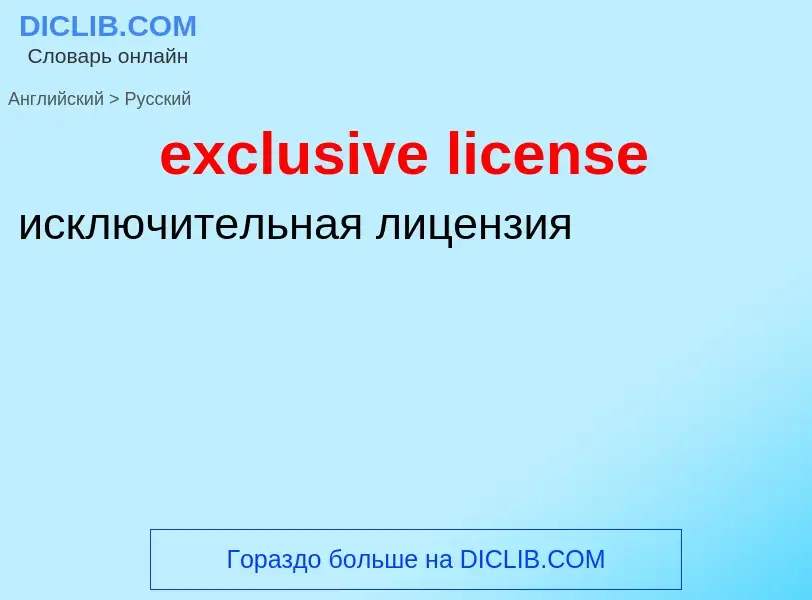Перевод и анализ слов искусственным интеллектом ChatGPT
На этой странице Вы можете получить подробный анализ слова или словосочетания, произведенный с помощью лучшей на сегодняшний день технологии искусственного интеллекта:
- как употребляется слово
- частота употребления
- используется оно чаще в устной или письменной речи
- варианты перевода слова
- примеры употребления (несколько фраз с переводом)
- этимология
exclusive license - перевод на русский
['lais(ə)nsiŋ]
существительное
общая лексика
лицензирование
выдача разрешений
лицензий и т. п.
выдача патента на торговлю спиртными напитками
['lais(ə)ns]
общая лексика
английское написание слова license
лицензия
существительное
['lais(ə)ns]
общая лексика
лицензия
удостоверение
патент
официальное разрешение
патент на продажу спиртных напитков
(излишняя) вольность
злоупотребление свободой
распущенность
отклонение от правил
норм (в искусстве, литературе)
разрешение, лицензия
отклонение от правила, нормы (в искусстве, литературе)
синоним
['lais(ə)nst]
прилагательное
общая лексика
имеющий разрешение
право
лицензию
патент (на что-л.)
имеющий патент на право торговли спиртными напитками
дипломированный
аттестованный
имеющий аттестат или свидетельство об окончании учебного заведения
признанный
известный
имеющий разрешение, право, привилегию, патент (на что-л.): licensed victualler - трактирщик с правом торговли спиртными напитками
привилегированный, признанный
неодобрительное выражение
узаконенный
Определение
Википедия

A license (or licence) is an official permission or permit to do, use, or own something (as well as the document of that permission or permit).
A license is granted by a party (licensor) to another party (licensee) as an element of an agreement between those parties. In the case of a license issued by a government, the license is obtained by applying for it. In the case of a private party, it is by a specific agreement, usually in writing (such as a lease or other contract). The simplest definition is "A license is a promise not to sue," because a license usually either permits the licensed party to engage in an activity which is illegal, and subject to prosecution, without the license (e.g. fishing, driving an automobile, or operating a broadcast radio or television station), or it permits the licensed party to do something that would violate the rights of the licensing party (e.g. make copies of a copyrighted work), which, without the license, the licensed party could be sued, civilly, criminally, or both.
In particular, a license may be issued by authorities, to allow an activity that would otherwise be forbidden. It may require paying a fee or proving a capability (or both). The requirement may also serve to keep the authorities informed on a type of activity, and to give them the opportunity to set conditions and limitations.
A licensor may grant a license under intellectual property laws to authorize a use (such as copying software or using a patented invention) to a licensee, sparing the licensee from a claim of infringement brought by the licensor. A license under intellectual property commonly has several components beyond the grant itself, including a term, territory, renewal provisions, and other limitations deemed vital to the licensor.
Term: many licenses are valid for a particular length of time. This protects the licensor should the value of the license increase, or market conditions change. It also preserves enforceability by ensuring that no license extends beyond the term of the agreement.
Territory: a license may stipulate what territory the rights pertain to. For example, a license with a territory limited to "North America" (Mexico/United States/Canada) would not permit a licensee any protection from actions for use in Japan.
Again, a shorthand definition of license is "a promise by the licensor not to sue the licensee". That means without a license any use or exploitation of intellectual property by a third party would amount to copying or infringement. Such copying would be improper and could, by using the legal system, be stopped if the intellectual property owner wanted to do so.
Intellectual property licensing plays a major role in business, academia and broadcasting. Business practices such as franchising, technology transfer, publication and character merchandising entirely depend on the licensing of intellectual property. Land licensing (proprietary licensing) and IP licensing.


